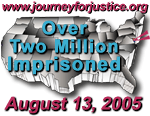 Organizing
a Speakers' Forum Organizing
a Speakers' Forum
For your public event you may want to feature a panel of spokespersons,
but you're not sure what that is. It means the formal presentation
of a selected group of speakers to a public audience. Speakers
are usually seated next to each other behind tables facing the
audience, sometimes separated by the moderator's chair in the
middle.
After a speaker is introduced, he or she steps to a podium,
or lecture-stand, to speak for a set period of time to address
the public. The moderator introduces the next speaker (if there
is one), and so on through the panel. Before beginning, the moderator
should work out an order of speaking agreed to by each panelist.
Ideally, the speakers you select for your speakers forum or
panel will offer listeners a blend of viewpoints about your meeting's
purpose or agenda. The "panel" members should be selected
carefully for what they know, and their ability to effectively
teach on the subject of the drug war's damage. This is important
because the audience will very likely accept them as experts.
A panel presentation is not a debate. Avoid inviting someone
you suspect would probably be disruptive to your agenda, for
example, a local judge who sentences drug users to prison, the
head of the drug task force, or the county prosecutor. In other
words, if you had intended to schedule a debate, it would be
billed and promoted as a debate, a contest.
The audience at your panel discussion should enjoy a relaxed
opportunity to hear and judge different views on the subject,
minus the atmosphere of competition that defines formal debates.
Your invited panel speakers should be at ease knowing they won't
be facing off in a public forum with representatives of the opposing
view sitting next to them.
Expect, however, that members of your audience might hold
opposing views -- and share them before the event is over!
Remember, your moderator has told panelists beforehand how
long each one has to speak. The moderator should be skilled at
helping panelists avoid arguments and speaking past time limits.
Pay attention to working out these details about how the moderator
communicates with panelists and members of the audience. Public
meetings must be timely, and most who attend will appreciate
and respect how well this is done.
Your group has planned an agenda that includes time for questions
and comments from the audience. Before closing, the moderator
thanks all panelists and the audience for participating.
If you want to plan a speaker's forum or panel discussion,
your group will ask, "Who else locally might join Journey
speakers on a "panel?" Since the Journey is demanding
an early release system for federal prisoners, other panelists
could include individuals or groups that minister to prisoners.
If there's a college in your area, you might find a criminologist
who has become an expert on prison overcrowding. You may know
someone with a loved one in prison who could speak about impact
on families. Other possibilities: an experienced defense attorney,
professional counselor, journalist, public health official, religious
leader.
If you don't know other people who might be appropriate to
join a panel, you can still plan a public forum and use one or
more Journey for Justice speakers. In this case you would call
your event a speaker's forum. This could happen by accident if
one or more panelists fail to show up; so stay flexible in planning
and accepting of unanticipated changes.
If you can only feature a Journey speaker at your meeting,
our presentation may include use of a PowerPoint, stand-up displays,
petitions, newspaper, or video documentary. You will want to
discuss these potential details with a member of our staff during
an early stage of your planning, and always keep your group notified
of any plans you make with us.
As you plan the event's agenda with your local volunteers,
remember to leave time for adequate discussion with the audience
after all speakers' presentations. Panel members should expect
to hear comments from the audience and address questions and
concerns. If you have a Speaker's forum, you should plan for
the same period of audience participation. This is very important.
A speaker's forum or panel is a public event. You will want
to study other portions of this website that assist you with
publicizing a Journey for Justice event.
Remember, your objective is to attract an audience to hear
and view the presentations. Your group may want to set up informational
tables, and you should have people ready to greet the arriving
public. For details on including these important tasks, review
details provided at: Organizing
a Public Event.
Back to the top

|









